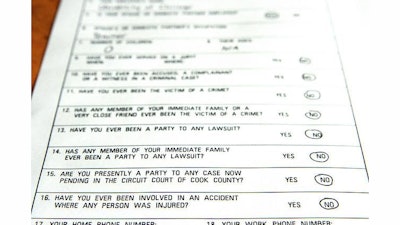
A recent decision by the City of Des Moines in Iowa to implement a mandatory bidder's questionnaire for public bidding stirred controversy. Opponents argue that such probing questionnaires are a needless expense, considering that bid and performance surety bonds are already meant to safeguard the public from contractor wrongdoing. The measure applies to very specific projects, with estimated costs often exceeding $1,000,000.
To be fair, such questionnaires are not uncommon. Local authorities in a number of states require their submission two weeks prior to the public bidding. However, it's not clear whether they bring any additional value to the selected bidder. Some opponents argue that they open a door for favoritism and bias in the process of choosing the most deserving bidder.
Responsive AND responsible?
Public contracts are usually awarded to the lowest bid. In addition to offering the right price, however, the bidder has to be qualified as responsive. To determine that, the city collects evidence from the way the bidder responded to the call for bids, and whether he or she followed all instructions for the bid and met all requirements.
The bidder also has to convince the jury that he or she is responsible. Meaning, is the lowest bidder qualified to do the work? Do they have an excellent track record and business references?
In many instances, a bidder may be deemed non-responsive if he or she doesn't complete the questionnaire two weeks before the bid opening.
What's in the questionnaire?
Even though public bidding can involve various services such as maintenance, construction or emergency projects, the additional information required of contractors more or less comes down to the following points:
- How long has the company been in business?
- Years of experience as a prime contractor and/or subcontractor.
- Identify upper management responsible for the proposed bid.
- Provide a statement of no-conflict of interest.
- List each contract completed during the last three to five years. Provide a brief description of the work performed, the price, date completed and contact information of the commissioning entity.
- List available equipment.
- Has the bidder ever been disqualified from bidding, contracting or proposing? Debarred? Declared ineligible?
- Has there been a case when a public entity found the bidder in default under a surety agreement?
- Are there any pending proceedings regarding bidder's responsibility, suspension or debarment to receive a public contract?
- Has the bidder ever been convicted of misdemeanor or felony in a local, state or federal court?
- Is the bidder a subject of any pending investigation by any grand jury or other authority of any state or the federal government?
- Has the bidder ever been disqualified from submitting bids or entering into contracts with any governmental or public entity?
- Ever declared bankruptcy?
- Does the bidder have a history of claims filed on a surety or workers compensation?
- Provide certified financial statements for the last three fiscal years.
It’s common knowledge that the surety company underwriting the bond usually conducts a thorough investigation about the contractor in order to establish whether he or she is responsible and reliable. The information collected through the questionnaire mostly overlaps with the surety. The difference, and advantage to the bidder, is that the surety file is not a public document.
What’s in the contractor bond?
By definition, when bidding on public projects, contractors are obliged to provide a bid bond, and later if they are awarded the job – a performance and a payment bond. The surety bonds act as a type of guarantee that first, the bid is accurate; second, the job will be done with the highest possible quality, on time and according to contract specifics; third, the contractor will later pay all subcontractors, suppliers, and workers as promised.
Going back to the purpose of the questionnaire, it's not clear why the required bonds are not sufficient protection against contractor wrongdoings.
After all, bidder's eligibility and bidding capacity can be successfully judged by past performance and completion of projects, general experience and expertise, financial standing and equipment availability. This information can be easily verified, and normally is by the surety underwriting the bond, because it can directly affect the bond premium. Especially if the cost of the project is high, the surety would not want to risk possible claims down the line.
For or against
Governmental or public entities would be able to determine who is the lowest responsible bidder based on important performance details and not only on the price. The detailed questionnaire is needed because:
- It provides more information; thus bidders increase their chances for being considered.
- It's common sense to know more about the bidder in order to make an educated decision.
- The questionnaire is not an opportunity for bias and favoritism; there is nothing wrong to ask a bidder about their company’s financial and moral standing.
- Some even think that it should be a requirement for all projects, not only for those exceeding $1,000,000.
On the contrary, its opponents argue that, specifically in the Iowa case, there was no evidence proving the previous bidder assessment methods inadequate. Instead:
- The questionnaire costs more taxpayer money. For every project that requires it, the City of Des Moines will have to spend $5,600 equal to the time city administration will need to review and check the provided data.
- The questionnaire is public information, a fact that many contractors may not like.
- It may encourage favoritism and bias based on the stated facts, therefore, tarnish the process of fair competition.
- It will result in higher bids.
- It's “an unnecessary expense that duplicates measures already in place,” meaning the bond underwriting.
Vic Lance is the founder and president of Lance Surety Bonds Associates. He is a surety bond expert who helps contractors get licensed and bonded. Vic graduated from Villanova University with a degree in Business Administration and holds a Masters in Business Administration (MBA) from the University of Michigan’s Ross School of Business.



















